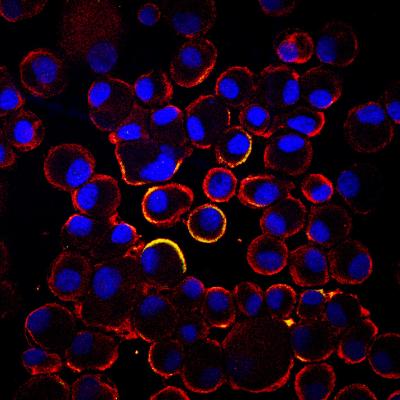
Image courtesy of Miami University Miller School of Medicine
December 9, 2014 — CardioCell LLC announced the treatment of its first patient in the University of Pennsylvania’s Phase IIa clinical trial for chronic heart failure (HF) of non-ischemic cardiomyopathy. The trial, “Single-blind, Placebo-controlled, Crossover, Multi-center, Randomized Study to Assess the Safety, Tolerability and Preliminary Efficacy of a Single Intravenous Dose of Ischemia-tolerant Allogeneic Mesenchymal Bone Marrow Cells to Subjects With Heart Failure of Non-ischemic Etiology,” is recruiting 20 eligible patients from three sites – Emory University, Northwestern University and the University of Pennsylvania.
Non-ischemic chronic HF is characterized by a viable but non-functioning myocardium in which cardiomyocytes are alive but are not contracting as they should. CardioCell’s therapy uses itMSCs that secrete large numbers of cytokines and growth factors, and this study will test if their unique properties will transition patients’ cardiomyocytes from viable to functioning, eventually restoring or improving heart function.
Chronic HF represents the single largest cause of natural death in the United States. Approximately 5.5 million individuals suffer from chronic HF, and it generates more than 1 million hospitalizations annually, with a 50-percent mortality and re-admission rate after 60-90 days post-discharge. About 35 percent of chronic HF patients suffer from abnormal heart function not related to coronary artery disease. In these cases the heart weakens and enlarges, preventing the efficient pumping of blood to the lungs, liver and other systems. This study is designed to test if itMSC treatment via intravenous injection can show efficacy in these patients with non-ischemic cardiomyopathy.
The Phase IIa clinical trial divides half of the patients into a treatment group and the other half into a control group. CardioCell’s treatment and the placebo are administered intravenously. Progress is tracked at the baseline, at 90 days and at 180 days. MRI measurements are used to capture improvements in ejection fraction (EF) and segmental changes in contractility. At 90 days after the first injection, the control group receives CardioCell’s treatment, and the previous treatment group will become the control group receiving saline solution. Thus, all the participants will receive treatment. The endpoint includes EF measurements every three months to observe signs of efficacy.
Only CardioCell’s chronic HF therapies feature itMSCs, which are licensed from CardioCell’s parent company Stemedica. Unlike all other MSCs – which are grown under normoxic conditions – Stemedica’s bone-marrow-derived, allogeneic itMSCs are unique because they are grown under hypoxic conditions. In vitro experiments demonstrate cells that are exposed to hypoxic conditions show greater homing and engraftment than cells grown under normoxic conditions. Compared to other MSCs, itMSCs secrete higher levels of growth factors and other important proteins associated with neoangiogenesis and healing.
For more information: www.stemcardiocell.com


 November 19, 2021
November 19, 2021 









